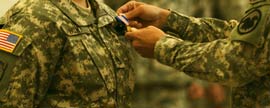Are There Any Rules for Administering Corrective Training?
- The corrective training must be directly related to the deficiency.
- The corrective training must be oriented to improve the Soldier’s substandard performance.
- The corrective training may take place during normal duty hours or after normal duty hours.
- The corrective training cannot be used as punishment.
- The corrective training must not be used as a punishment to avoid the procedural safeguards of Article 15, UCMJ.
- The corrective training should continue only until the substandard performance or training deficiency is corrected or overcome.
- The corrective training must not be designed to demean or embarrass the Soldier.
- The corrective training must be performed with the proper tools and resources.
- The method in which the corrective training is executed must not be ridiculous.
Example:
A Soldier failed to properly clean the latrine one morning and you decided the corrective training would be to clean the latrine floor with a toothbrush. This could be considered ridiculous. The Soldier should be afforded the opportunity to perform the task with the normal tools they would normally have on hand.
- Deficiencies satisfactorily corrected by means of corrective training and instruction will not be noted in the official records of the Soldiers concerned.
Although not required, Commanders should consider requiring leaders to conduct performance counseling when imposing corrective training. This provides a written record of the event and ensures that the Soldier is notified of their shortcomings and consequences for continued substandard performance. - I always required my leaders to document corrective training using a DA FORM 4856. These records can be useful in the event of misunderstandings, complaints or separation actions. Ensure anytime a Soldier is counseled you complete the Assessment portion of the DA FORM 4856. If the assessment block of the counseling form is not completed for an event oriented (Performance) counseling the DA FORM 4856 is considered legally incomplete. This means JAG can reject using the counseling statement for the purpose of separating a Soldier from the service.
- Unless directed by the Commander or First Sergeant, corrective training should be supervised by the leader imposing the corrective training. Do not rely on the CQ or Staff Duty NCO to supervise your Soldier’s corrective training. If the misconduct warrants corrective training then it is important for you to be present, even after duty hours, to supervise the training. This demonstrates to the Soldier that you care enough to take a personal interest in correcting the Soldier’s substandard performance and allows you to ensure the corrective training meets the standard. Think about it this way, what message are you sending to a Soldier if you implement corrective training but have another leader supervise the corrective action? In my opinion, this type of behavior is unprofessional and tells the Soldier that you are a selfish leader and that you have two sets of standards, one for yourself and one for your subordinates. Your actions speak louder than your words! As a senior leader when I observed or found out one of my leaders gave corrective training and failed to supervise it, I formally counseled the leader and implemented corrective training for the leader and I personally supervised the leaders corrective training.
TIP: When administering corrective training all leaders should apply the reasonable person rule. Ask yourself this questions: Would a disinterested reasonable leader find my decision, action, and/or corrective training reasonable? If not you should reevaluate, because more than likely it is a bad idea to proceed. Keep in mind corrective training is designed to correct and educate.
For More Information on corrective training read the Mentor
Facebook: https://www.facebook.com/MentorMilitary/
Facebook: https://www.facebook.com/Asktop/
Twitter: https://twitter.com/
AskTOP Newsletter: http://eepurl.com/bjcYH
YOUTUBE: Mentor Military https://www.youtube.com/channel/UCj0IXu7SmA2wLoPrNAUfSZA
Websites:
LinkedIn: https://www.linkedin.com/company/mentor-enterprises-inc/














Comments
John Spears
I just read your article about corrective training. I am trying to find the actual regulation number for this. I understand that it has changed in the past few years and now any physical corrective training must be performed by the NCO as well as the soldier who is under going the corrective training. Please advise
John Spears
Mark Gerecht
John my apologies for the delayed response. The regulation is AR 600-20. We have several videos explaining corrective training to include the new rules on our YOUTUBE Channel Mentor Military. Please take a look at those, will probably answer your questions. Respectfully, TOP